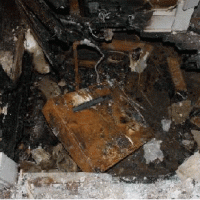As the temperature outside slides from the cold to the “bitter” cold range on the thermometer, most people tend to turn the heat on inside their home. Some homes, however, do not have whole house heat or sufficient heating capacity and therefore the occupants may rely on portable space heaters. Portable space heaters, used properly, can be a good choice to warm a small area of a home. Unfortunately, while they can warm your cold and tingling hands and feet, they can also warm nearby materials to the point of ignition.
To illustrate this, we recently read a newspaper report regarding a fire in a local residence. Eyewitness accounts and the subsequent investigation determined that the cause of the fire was a space heater that was positioned too close to bedding and a wood paneled wall.
Warren has investigated several fires involving portable space heaters where the wrong grade of fuel was used to fuel the heater (gasoline used in a kerosene heater for instance). Also, some of our investigations have determined that heaters were improperly mounted to the wall or located on unlevel surfaces, making them susceptible to falling over and igniting the carpet or wood floor, as shown in the case photo below.
The NFPA offers the following safety tips:
- Have a three-foot “kid-free zone” around open fires and space heaters.
- Supervise children when a fireplace, fire pit, or other space heater is being used. Use a sturdy, metal screen to prevent contact burns, which are even more common than flame burns.
- All heaters need space. Keep things that can burn, such as paper, bedding or furniture, at least 3 feet away from heating equipment.
- Use heating equipment that has the label of a recognized testing laboratory.
- Never use your oven for heating.
- Install stationary space heating equipment, water heaters or central heating equipment, according to the local codes and manufacturer’s instructions.
- Have a qualified professional install the equipment.
- Make sure all fuel-burning vented equipment is vented to the outside to avoid carbon monoxide poisoning. CO is created when fuels burn incompletely. CO poisoning can cause illness and even death. Make sure the venting for exhaust is kept clear and unobstructed. This includes removal of snow and ice around the outlet to the outside.
- Install and maintain carbon monoxide alarms to avoid risk of carbon monoxide poisoning.
- Maintain heating equipment and chimneys by having them cleaned and inspected annually by a qualified professional.
Additional tips can be found at:
National Fire Protection Association (NFPA) Website
Underwriters Laboratories (UL) Website
Founded in 1997, The Warren Group, forensic engineers and consultants provides technical investigations and analysis of personal injury and property claims as well as expert testimony for insurance adjusters and attorneys. Extremely well versed in the disciplines of mechanical, electrical, chemical, structural, accident reconstruction and fire and explosion investigation, our engineers and consultants are known for delivering the truth — origin, cause, responsibility and cost of an event or claim — with unmistakable clarity.




